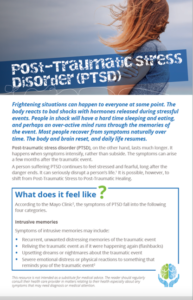Mental Health Resources
Information on this website is not intended as a substitute for the medical advice of physicians. All readers should regularly consult a physician in matters relating to his/her health, particularly with respect to any symptoms that may require diagnosis or medical attention.
These booklets have been developed using credible reliable resources to help you navigate and learn more about any of the following mental health conditions that you, a loved one or friend might be facing. Each booklet contains additional links to further resources for you to explore.
You are not alone.
Thank you to all the amazing volunteers who have helped create these resources and to Ali Abid for his mentorship and vision for this project.
We are also grateful for the excellent existing resources we have been able to use to create these resources.
Anxiety
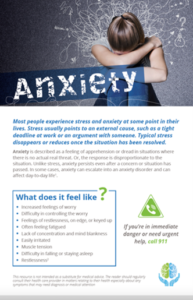
Most people experience stress and anxiety at some point in their lives. Typical stress disappears or reduces once the situation has been resolved. Anxiety is described as a feeling of apprehension or dread in situations where there is no actual real threat. Or, the response is disproportionate to the situation. Unlike stress, anxiety persists even after a concern or situation has passed. In some cases, anxiety can escalate into an anxiety disorder and can affect day-to-day life.
Grief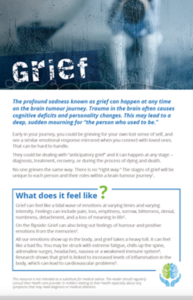
The profound sadness known as grief can happen at any time on the brain tumour journey. Trauma in the brain can often cause cognitive deficits and personality changes. This may lead to a deep, sudden mourning for “the person who used to be.” No one grieves the same way. There is no “right way.” The stages of grief will be unique to each person and their roles within a brain tumour journey.
Loneliness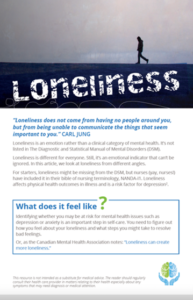
Loneliness is a feeling of being alone, isolated or disconnected from the world around you, and can happen even if you’re surrounded by family, friends and acquaintances. This could be because you may feel that you don’t have anyone to talk to about what you’re going through. Or you may feel unable to voice your feelings and experiences for fear of upsetting people, particularly those close to you.
Memory Changes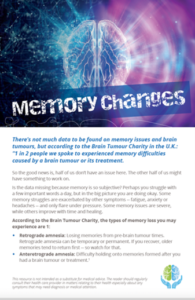
There’s not much data to be found on memory issues and brain tumours, but according to the Brain Tumour Charity in the U.K.: “1 in 2 people we spoke to experienced memory difficulties caused by a brain tumour or its treatment.”
Post-Traumatic Stress Disorder (PTSD)
Frightening situations can happen to everyone at some point. The body reacts to bad shocks with hormones released during stressful events. Most people recover from symptoms naturally over time. The body and brain reset, and daily life resumes. Post-traumatic stress disorder (PTSD), on the other hand, lasts much longer.
Additional Supportive Resources for individuals affected by brain tumours
These resources are compiled as additional links for individuals to review
This 8-minute video offers an overview of the Vagus nerve. The longest cranial nerve, it oversees a vast array of crucial bodily functions and may hold the key to relief from anxiety, chronic pain, and other issues affecting those living with brain tumours. The video previews of some free YouTube and other online resources for starter exercises to tone the Vagus nerve.
This 11-minute video offers an overview of Somatic Movement and gentle self-care exercises for bodily unwinding and the resetting of the Vagus nerve. It also provides a brief overview of a variety of freely available Feldenkrais movement teachings, which are called ATMs or Awareness through Movement practices. These teachings focus on eye and hand awareness and are to be done with no pain or discomfort
The previous two videos on the Vagus nerve covered movements or practices that could be done seated, lying down or even just imagined in mind. This third video goes a bit beyond the basic Vagal tone training and into deeper practices. These might be worth exploring for possibilities in cross-brain training (with a lot of Qigong offerings including standing exercises), neurosensory explorations and the Emotional Freedom Tapping system.

